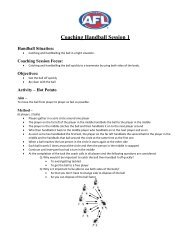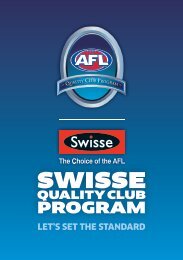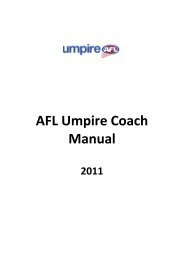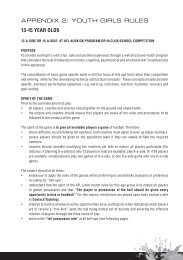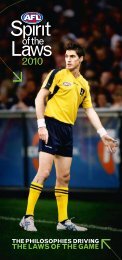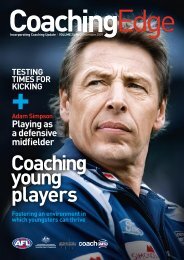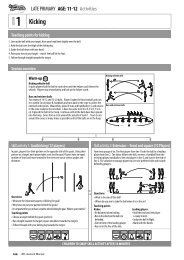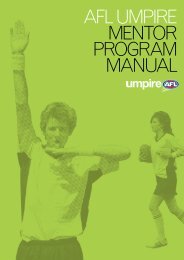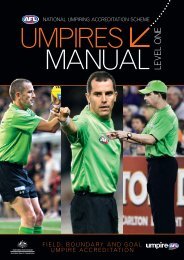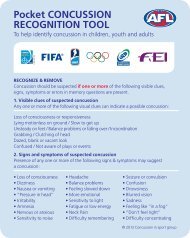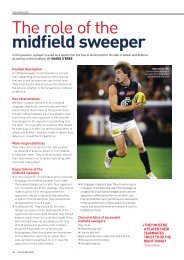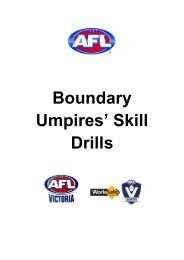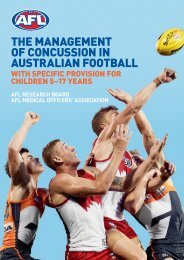2012 Youth Coaching Manual - AFL Community
2012 Youth Coaching Manual - AFL Community
2012 Youth Coaching Manual - AFL Community
Create successful ePaper yourself
Turn your PDF publications into a flip-book with our unique Google optimized e-Paper software.
When developing games for a particular purpose, as a coach you must have answers to the following questions before<br />
explaining the drill to your team. Some questions to think about when developing your game sense drills can include:<br />
• What particular themes or tactics do I want to focus on in the game?<br />
• What will be the main challenges to the players?<br />
• What are the rules and who will umpire?<br />
• What will the dimensions of the playing area be?<br />
• How can I extend or modify the game to continually challenge the players?<br />
• How can I construct bias if necessary to make individuals work harder than others?<br />
• How can I include all players in the game?<br />
• Will I carefully pre-select teams or will I run with several captains choosing teammates?<br />
When discussing game sense, one very important aspect is that of questioning players on specific outcomes or focusing on<br />
specific aspects, which have been evident or not evident during the game.<br />
It is important not to spend too long questioning the team as part of the success of a game sense approach is in fact the<br />
playing. Questions will generally relate to aspects of the game and are used to enable players to reflect and then visualise<br />
in a match-day situation.<br />
The types of questions a coach might use include:<br />
“What happens when you handball short?”<br />
“How can you create more time for the receiver to decide and dispose?”<br />
“How can you identify if a team mate is clear?”<br />
Player empowerment … players as game-designers<br />
So far, information relating to game sense has been coaching-team facilitated and led. Once players are familiar with the<br />
concept of game sense and its relationship with aspects of the game, players can then be empowered to work in small groups<br />
or individually and presented a task of developing a game.<br />
This can be an exciting, enjoyable and valuable process in reinforcing key concepts, tactics and themes and assists in the<br />
development of leadership within the group.<br />
In this approach, the coach would explain the concept and construct some clear guidelines which players would use to<br />
develop a game. Some guidelines might include:<br />
• Your game must run for about 15-20 minutes.<br />
• It must focus on a particular aspect of the team plan (themes or guidelines).<br />
• How will you explain the game?<br />
• Will there be a scoring system?<br />
• Who will umpire the game?<br />
• How will teams be selected?<br />
• What are some examples of player behaviour you might see, and how will you explain this to the group with strategies<br />
to improve this area?<br />
• What equipment is required? Who will organise this?<br />
• What will the playing dimensions be? Can this be extended?<br />
Coaches, step back<br />
It is necessary to stress that the young player’s interest in processing information and problem solving at the same time will<br />
only be possible if the coach steps back from the practice and allows players the time to confront the challenges on their own<br />
and/or with teammates. Well-designed practices will ensure that the desired outcomes are achieved according to program<br />
guidelines. During practice, coaches should concentrate on providing accurate feedback and prompting. If it is essential to<br />
accelerate the learning process beyond what is occurring during a particular mini-game, the coach should attempt to interact<br />
by asking questions rather than offering a series of commands. By using the above coaching approach, the coach can provide the<br />
player with a balance of interactions which contains a healthy mix of ‘do as you are told’ and self-discovery practices.<br />
<strong>AFL</strong> <strong>Youth</strong> <strong>Coaching</strong> <strong>Manual</strong><br />
55



